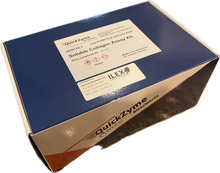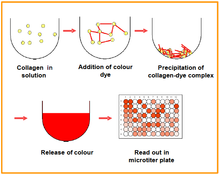Description
The QuickZyme Soluble Collagen Assay kit is a quantitative, dye-binding method for the measurement of all types of fibrillar collagen, in a fast and simple 96-well plate format.
Type
Colorimetric Assay (Sirius Red Collagen Assay)
The QuickZyme Soluble Collagen Assay is based on binding of Sirius Red dye to collagen. Following binding of the dye, the collagen-dye complex precipitates, resulting in a colored pellet. This color can be released in an alkaline solution and then read with a microplate reader.

Specifications
| Type of Collagen Measured | Measures all types of fibrillar collagen, species independent. Measures soluble or solubilized collagens. |
| Assay Range | 0.5 - 10 μg/ml |
| Sensitivity | 0.69 ng/ml |
| Format | 96-well plate |
| Sample Volume | 0 -140 μl |
|
Sample Types |
|
|
Assay Run-Time |
< 3 hours |
Application
Collagen is one of the main components of extracellular matrix. Dysregulation in collagen production results in pathologies such as fibrosis (too much collagen), or osteoarthritis (too little collagen). Therefore quantitative measurement of collagen production is important in many disease related studies.
The QuickZyme Soluble Collagen Assay measures various types of fibrillar collagen. The most abundant collagen types are collagen type I (skin, bone, vessels, connective tissue), type II (cartilage) and type III (skin, bone, connective tissue).
This assay is specific for collagen. After heating at 50°C the signal is lost, since the assay does not recognize denatured collagen (gelatin). The assay can be used to analyze soluble collagen or collagen that is solubilized by acetic acid alone or in combination with pepsin. The assay is intended for collagen analysis in conditioned cell culture media and cellular extracts. The assay is not affected by serum up to at least 10%.

Typical collagen standard curve in the range of 0.5 – 10 μg collagen/well (3.5 - 70 μg/ml; blank value 0.070).
Tutorial Video
Storage
Unopened kit:
- Store at 4°C. Do not use kit components past kit expiration date.
Opened kit / reconstituted reagents:
- Collagen standard dissolved in 20 mM HAc: store at 4°C up to 1 month
- Dye solution: store at 4°C up to 1 month
- Dilution buffer: store at -20°C up to 6 months
- Wash buffer: store at -20°C up to 6 months
- Detection solution: store either at 4°C or room temperature up to 1 month
Documents
- Product Datasheet (PDS)
- Frequently Asked Questions (FAQ)
- Application note 1: How to choose your collagen assay?
- Application note 2: How to measure collagen in mouse tissues?
- Application note 3: Collagen per protein analysis in fresh, frozen and formalin-fixed tissues
Product References
- Kondo, Masahiro et al. “Dersimelagon, a novel oral melanocortin 1 receptor agonist, demonstrates disease-modifying effects in preclinical models of systemic sclerosis.” Arthritis research & therapy vol. 24,1 210. 1 Sep. 2022, doi:10.1186/s13075-022-02899-3
- Kiseleva, Ekaterina et al. “Interaction between mesenchymal stem cells and myoblasts in the context of facioscapulohumeral muscular dystrophy contributes to the disease phenotype.” Journal of cellular physiology vol. 237,8 (2022): 3328-3337. doi:10.1002/jcp.30789
- Quesnel, Katherine et al. “CCN1 expression by fibroblasts is required for bleomycin-induced skin fibrosis.” Matrix biology plus vol. 3 100009. 6 Jul. 2019, doi:10.1016/j.mbplus.2019.100009
- Kano, Miyu et al. “Attenuation of murine sclerodermatous models by the selective S1P1 receptor modulator cenerimod.” Scientific reports vol. 9,1 658. 24 Jan. 2019, doi:10.1038/s41598-018-37074-9
- Matsushita, Takashi et al. “BAFF inhibition attenuates fibrosis in scleroderma by modulating the regulatory and effector B cell balance.” Science advances vol. 4,7 eaas9944. 11 Jul. 2018, doi:10.1126/sciadv.aas9944
- Han, Zonglin et al. “Inhibition of prostaglandin E2 protects abdominal aortic aneurysm from expansion through regulating miR-29b-mediated fibrotic ECM expression.” Experimental and therapeutic medicine vol. 16,1 (2018): 155-160. doi:10.3892/etm.2018.6160
- Goldstein, Benjamin D et al. “Chronic asthma and Mesenchymal stem cells: Hyaluronan and airway remodeling.” Journal of inflammation (London, England) vol. 14 18. 30 Aug. 2017, doi:10.1186/s12950-017-0165-4
Related Products
Ilex Life Sciences LLC is an official distributor of QuickZyme Biosciences.






